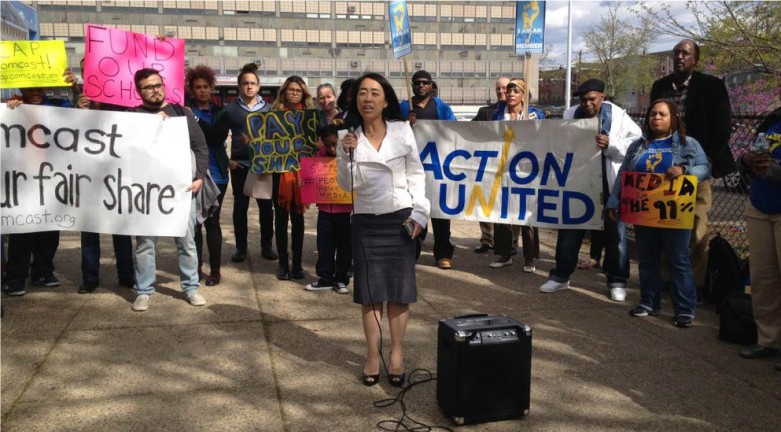
Comcast: 'They'll Smile and Lie to You'
This week I attended two public hearings where Philadelphia residents vented to city officials about their frustrations with Comcast.
These were the first of six hearings scheduled to gather input before Philadelphia begins negotiating the terms of Comcast’s next 15 years of operation in the city.
At the hearings, a panel of city officials listened while people spoke about Comcast’s poor service and high prices, the lack of competition and the tax abatements the company enjoys while the city suffers from severe budget shortfalls. The first person to testify set the tone: “Comcast has horrible technical support and customer service,” he said. “I think the only way to repair this issue is to have competition in cable.”
Of the 50 or so people who spoke that day, only one had anything remotely positive to say about Comcast (that it provides financial support to a nonprofit she’s involved with).
Comments like this woman’s were more typical: “I’ve been a Comcast customer since January, and have experienced nothing but anguish,” she said. “Why do we have to renew their franchise at all?”
People urged city officials to end tax abatements, negotiate shorter franchise terms and consider options like municipal broadband.
“I have horror stories about Comcast,” said one elderly woman. “I’m over 80 years old, and have bills over $120. I call them, and they say pay it and we’ll adjust it. So I paid it. They say your next bill will be $22. It’s $140 … They’ll smile and lie to you. It’s unbelievable.”
Two candidates running for Philadelphia City Council at-large seats showed up at Tuesday afternoon’s press conference and hearing. Candidate Helen Gym questioned what Philadelphia gets out of Comcast’s tax abatements — and echoed the popular demand that Comcast pay more taxes to help fund cash-strapped city schools.
“I’m a teacher and we don’t even get paper from the school district,” said one young woman. “Yet Comcast doesn’t pay full property taxes on its buildings?”
“If Comcast paid its taxes,” said Gabe Speller, another teacher, “it would single-handedly shift the situation of our school system.”
Internet Essentials, Comcast’s much-touted program for low-income families, also came under fire for its restrictive terms and low adoption rates. “The majority of my students who appeared in the Internet Essentials advertisement weren’t even aware of the program,” said a Philadelphia teacher.
Philadelphia ranks 23rd in broadband-adoption rates among the 25 largest U.S. cities, and more than a third of the residents in Comcast’s hometown still don’t have broadband access — a fact that undermines the company’s attempt to project an image of responsible corporate citizenship. “I wouldn’t be surprised if Comcast spent more [money] marketing Internet Essentials to regulators in D.C. than to people throughout the country who were actually eligible for it,” said Action United leader Kia Hinton.
No one disputed that Comcast has failed at serving the customers in its own backyard. “We here in Philadelphia are very angry with you,” said Monica Rozi at the first hearing. Another woman expressed the same sentiment with less restraint, bellowing “I HATE COMCAST” at the end of her remarks to wide applause.
Unless and until substantive changes are made in the way Comcast serves Philadelphia, this kind of rage and frustration will continue simmering just below the surface.
If you’re a Philly resident and couldn’t make it to this week’s hearings, you can still speak out. There’s a hearing on Sat., May 2, and you can also comment by emailing, calling or writing the city of Philadelphia. Weigh in using one of the methods below:
Email: CitizenFeedback@phila.gov
Phone: 215-686-8125 (leave a message)
Mail: Cable Franchise Authority
Attn: Cable Television Administrator
City Hall, Room 702
Philadelphia, PA 19107
And to learn more about what our friends at the Media Mobilizing Project are doing to hold Comcast accountable, visit CAPComcast.org.